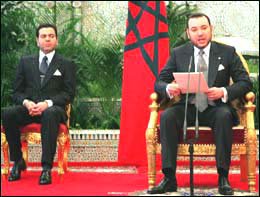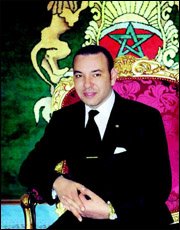- King Mohammed VI.

As we reported yesterday, the Moroccan King addressed the nation on radio and television, marking the conclusion to the work of the Equity and Reconciliation Commission (IER). The Commission was set up early 2004 to probe past human rights violations and to seek out-of-court settlement for victims. King Mohammed VI said on behalf of the emerging young generation: "Enough selfishness; enough isolation and waste of valuable opportunities; enough squandering of resources and energies in false struggles."
"It is high time we turned to the present and the future of our sons," said the monarch, affirming that the only way to do so is to be "committed to hard work, by pursuing the sacrifices made by the generations of the independence and of the Green March eras."
The sovereign stressed this cannot be achieved unless by "being committed to hard work, by pursuing the sacrifices made by the generations of the independence and of the Green March eras, and by forging ahead with a broad-based reform process, boosted by the resolve and enthusiasm of our youth."
Recalling his orders to publish the report of IER and the study on the country’s human development achievements and future prospects, the monarch called for drawing the necessary lessons from our history, “in a way that will shield our country from a repetition of what happened, and enable it to make up for what was lost.”
On the past human rights violations, King Mohammed VI asserted having sought with “courage, wisdom and resolve” to achieve the fair settlement of this issue, a “groundbreaking process started in the early 1990s by my reserved father, His Majesty King Hassan II.”
Hailing the work of IER, the monarch called on the Advisory Council on Human Rights “to implement the Commission’s recommendations” to reflect “my determination to promote the pursuit of truth, justice and reconciliation.”
The sovereign stressed that the sincere reconciliation does not aim to “put the past behind us” but rather to foster “collective forgiveness.”
This forgiveness, he said, "is likely to bolster the in-depth institutional reform under way, one that should enable our country to free itself from the blemishes of past civil and political rights abuses," therefore paving the way for "the second fifty-year post-independence period, and focus on the hard, decisive mission of promoting the economic, social and cultural rights of all Moroccans, especially those who suffer from poverty, illiteracy, unemployment and marginalization."
The king noted that he has ordered the setting up of a board of scholars to prepare a comprehensive study on the outcome of fifty years of human development and the prospects for the future, voicing hope this study "will serve as an incentive for all segments of our country's elite to resume their role in guiding the nation and spearheading strategic thinking."
At the end of his address, the monarch promised to see to it that state authorities do all they can in this respect, to ensure all Moroccans enjoy a life of dignity, and promote close cooperation between all the stakeholders concerned, through “upholding the virtues of integrity and merit, as well as enforcing the mechanisms of accountability and transparency, within the framework of the rule of law and of responsible citizenship.”

It was clear that the address to the nation was aimed at sending a strong message that the king intends to put an end to divisions among Morocco's elite about past human rights abuses and focus efforts on combating poverty and mass unemployment.
Tags: Morocco, Fès, Maghreb, news

No comments:
Post a Comment